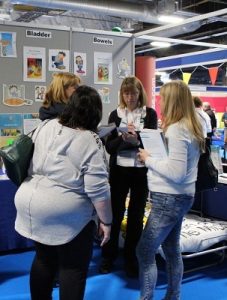This post has been written by Davina Richardson, Children’s Specialist Nurse at Bladder & Bowel UK, for World Bedwetting Day. Telling people what you do for a living, when you are a Children’s Specialist Continence Nurse produces a range of responses. Some people think that all I do is give nappies to children who have had difficulties with toilet training.
Yesterday someone, when warned by a relative not to ask what my job is, said “…I don’t mind… I had children… and I changed nappies.” Others say they don’t understand how I can work with wee and poo. But I don’t – I work with children and families. Few people who are not affected by problems with daytime wetting, night time wetting, constipation or soiling (when poo leaks into underwear) really understand how much difference my job can make. However, I try to help children and young people who are struggling with embarrassing problems that affect their lives and their families’ lives.
Bedwetting is the most common childhood continence problem
It affects up to 15.5 % of 7 ½ year olds. 3.3% of 7 ½ year olds have the problem more than two nights a week. Many children do not get better as they get older. 2% of teenagers are affected by bedwetting, as are some adults. Most teenagers who wet the bed are doing so at least three nights a week. Many children and young people affected have other continence problems. These include constipation, day time wetting, urgency (having to get to the toilet quickly) or frequency (having to go to the toilet more often than usual).
What lots of people do not know is that bedwetting can and should be treated in all children over the age of five years. For children younger than this, simple changes might make a difference. Therefore all children with bedwetting should be helped to understand that:
Drinking well is really important to help the bladder work well

- Primary aged children should be drinking about 1.5 litres of water based drinks a day
- Secondary school children should be drinking more than this and secondary school aged boys should be having up to 2.5 litres of water based drinks per day
- Children should avoid fizzy drinks as these can make bedwetting worse, by irritating the bladder
- Children should avoid drinks with caffeine in them (tea, coffee, hot chocolate, cola and many energy drinks). Caffeine can irritate the bladder and encourages the kidneys to make more urine (wee)
Eating plenty of fruit and vegetables helps prevent constipation. Constipation may cause bedwetting, or make it worse.
- Children who are constipated should have this treated as part of the treatment for bedwetting
They need to try and wee just before going to sleep. This makes sure they start the night with an empty bladder and gives them the best chance of a dry night.
It is also important that healthcare professionals understand that bedwetting may be caused by several different things
This includes the kidneys making too much wee during the night, the bladder not being able to store the wee for the full night and children not being able to wake up when their bladder is full. Healthcare professionals need to understand how to assess and treat children with bedwetting and how to help families chose treatments that will help.

Most healthcare professionals are not taught about children’s continence problems, including bedwetting when they are training. Therefore, a large part of my job involves training them about how to care for children and families. I also have been involved in teaching families about bedwetting and its treatment. It is important that families know there is help available for all children from the age of five years old and where they can find reliable and good information to help them.
The International Children’s Continence Society and European Society for Paediatric Urology recognised that many people underestimate the impact of bedwetting and that it affects children and families across the world. Therefore in 2015 they started World Bedwetting Day to help raise awareness of the problem. This year World Bedwetting Day is on Tuesday 28th May. There is more information about World Bedwetting Day at worldbedwettingday.com
Bladder & Bowel UK have lots of information leaflets for children and families
These resources are available on their website at bbuk.org.uk/children-young-people/children-resources/. These are all free to download and print. They also offer a confidential telephone helpline and email address to anyone affected by a bladder or bowel problem. This includes bedwetting. This provides confidential advice from qualified nurses who have specialised in continence problems. There is also an excellent website with lots of information about bedwetting and resources to help families speak to their healthcare professional about the problem at stopbedwetting.org.
Bladder & Bowel UK continues to offer training to healthcare professionals and to others about all aspects of continence including bedwetting.
For more information or support go to bbuk.org.uk or email bladderandboweluk@disabledliving.co.uk or telephone 0161 214 4591.
Davina Richardson


Comments are closed